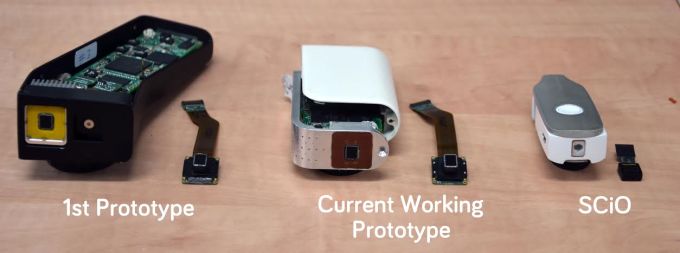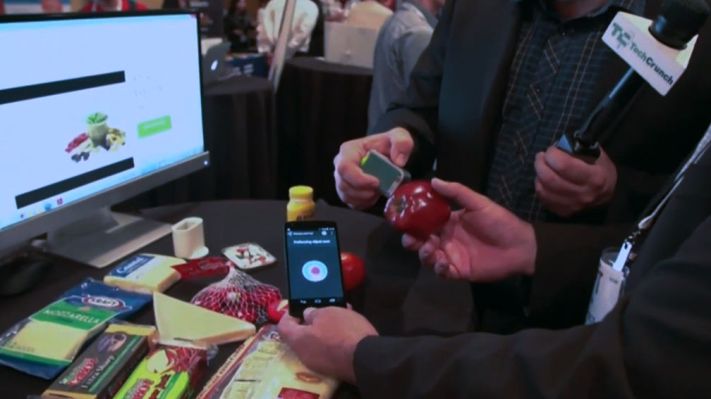Consumer Physics, the Tel Aviv-based startup behind the handheld molecular food scanner dubbed “SCiO,” has now topped $2 million in crowdfunding via its Kickstarter campaign, with 11 days still remaining. SCiO is basically a pocket-sized spectrometer that tells you the chemical makeup of what you eat, including nutritional info like calories, carbs, sugars, and more. More than 10,000 backers have donated to the startup, which also has funding from Khosla Ventures, Dov Moran (Comingo founder, flash drive inventor), and other angel investors.
The company also previously raised money through OurCrowd, a hybrid VC-equity crowdfunding platform. According to CrunchBase, Consumer Physics has $4 million in prior funding. [Update: the company says it’s actually closer to “more than $5 million” but won’t disclose the exact figures.] They’ve been raising the additional funds on Kickstarter for under a month.
We first got a hands on with the SCiO scanner at this year’s TechCrunch Disrupt NY’s Hardware Alley, where CEO Dror Sharon was demonstrating a prototype. TechCrunch’s own John Biggs even took it for a test spin (see video below).
What makes this device interesting to a consumer market is its cost and small size. It’s Star Trek-like technology, basically speaking. Kickstarter backers were paying under $200 for a scanner or DIY “maker’s kit.”
With SCiO, users will be able to do things like scan their foods to see the caloric content, the fat or sugars they contained, how ripe a fruit is, and even how pure a cooking oil is or if a pill (yes, it can do non-food items, too) was real or fake.
The device itself includes a light source that illuminates the sample and a spectrometer (an optical sensor) that collects the light reflected from the sample, which is what helps it determine the item’s molecular makeup.

After scanning the object in question, the device communicates with a mobile app via Bluetooth, which in turn forwards the lookup to a cloud-based service for review. The app then returns the information requested in real-time.
In addition to the scanner itself, SCiO is offering a platform for developers who would be able to build custom applications using its technology. For example, suggests the Consumer Physics website, developers could teach the SCiO to monitor the various stages of the brewing process for those who make their own craft beers, or they could teach it to identify various plastics to help with recycling. The company envisions a future where the scanner could be used to measure the properties of a range of items, including things like cosmetics, clothes, flora, soil, jewels and precious stones, leather, rubber, oils, plastics, and more.
Some believe that with the SCiO’s miniaturization, the company has sacrificed sensitivity for size — and to a point, that may be true. Along those lines it’s also worth noting that the scanner is not meant to be a medical device used to prevent allergies, for example.
By reaching the $2 million+ point on Kickstarter, the SCiO has now become the fifth most-funded tech campaign in the site’s history, and it still has nearly two weeks left. Among the backers are over 600 developers, hackers and makers, and researchers who have signed up to build their own apps and form factors leveraging the SCiO platform.
Having now hit this funding milestone, Consumer Physics says it will offer all first-party developed apps for SCiO to Kickstarter backers for free for life.
